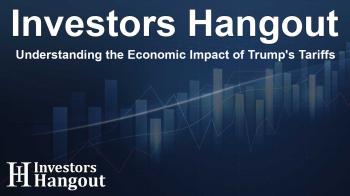Understanding the Economic Impact of Trump's Tariffs

Tariffs as a Financial Burden on American Citizens
Recent trade and tariff policies have sparked significant debate about their impact on the American economy. One notable voice in this discourse is Ross Gerber, CEO of Gerber Kawasaki Wealth and Investment Management. He has argued that these tariffs effectively act as a tax on American citizens, shifting financial burdens in unexpected ways.
Impacts of Tariffs
On a recent social media post, Gerber highlighted how these tariffs function as a consumption-based tax. Originally aimed at encouraging domestic manufacturing, they have instead increased financial strain on American households. According to his analysis, the regressive nature of these tariffs affects those with the least disposable income the most, transferring the tax burden from wealthier individuals to everyday Americans.
He noted that while tariffs apply uniformly across various products, their financial impact varies significantly based on income levels. This characteristic raises concerns about fairness in the tax system, as families with lower incomes end up financing a larger percentage of their earnings due to these policies.
Experts Share Concerns
Many financial experts share Gerber's viewpoint. Kevin O'Leary, a prominent investor, characterized these tariffs as a de facto value-added tax on American consumers. He emphasized that while the U.S. does not have an official VAT, the consequences of these tariffs mirror that effect, impacting the purchasing power of consumers.
Flattening Consumption Patterns
“The tax is not defined by its label; it’s the impact that matters,” O'Leary remarked, noting that these changes could lead to a widening income gap. He particularly emphasized how the name given to these policies distracts from their actual economic effects.
Bipartisan Concerns and Legislative Action
Amid rising consumer discontent, a bipartisan group of lawmakers has been vocal about the need to address specific tariffs. Representative Ro Khanna pointed out the burden of tariffs on everyday items like coffee, which the country imports significantly. He described the tariffs as a considerable financial strain on consumers, calling it a tax that affects Americans daily.
Wider Economic Repercussions
Peter Boockvar, CIO at Bleakley Financial Group, has articulated the extensive repercussions tariffs could have on American businesses. He highlighted the expected economic impact if tariffs remain on imported goods. His estimates suggest that a baseline 15% tariff on $3.3 trillion worth of imports translates to about $500 billion in new taxes for businesses, effectively reversing tax cuts previously enacted.
Feeling the Pressure
This growing financial pressure has generated discussions around the intended benefits of the tariffs versus their actual effects, leading to worries about long-term economic stability. Many businesses are now reconsidering their strategies in light of these costs, adding another layer of complexity to an already challenging economic landscape.
Consumer Sentiment
The ongoing tension around tariffs has led to increasing frustration among consumers. With prices rising on household staples, there is a growing desire for solutions to alleviate this financial burden. Advocates for reform are hoping to see constructive legislative measures that address these issues, making everyday life more manageable for Americans.
Conclusion
The conversation around tariffs is far from over, and as the landscape continues to evolve, it is crucial to pay attention to how these policies affect the average American. The insights shared by industry experts like Gerber, O'Leary, and others shed light on the pressing challenges that arise from these tariffs, prompting important discussions about future economic strategies.
Frequently Asked Questions
What are the main effects of Trump's tariffs on Americans?
Trump's tariffs are viewed by experts as taxes that disproportionately burden lower-income households, raising prices on essential goods.
Why are tariffs considered regressive?
Tariffs are deemed regressive because they take a larger percentage of income from low-income households compared to wealthier ones.
How do experts compare tariffs to a value-added tax?
Experts point out that tariffs effectively function like a value-added tax, increasing costs for consumers without being labeled as such.
What legislative actions are being discussed regarding tariffs?
Some bipartisan lawmakers are advocating for reforms to specific tariffs, particularly those affecting everyday items like coffee, due to their financial burden on consumers.
What is the projected economic impact of tariffs on businesses?
Predictions suggest that tariffs may result in significant costs for businesses, potentially undoing previous tax cuts and affecting overall economic health.
About The Author
Contact Addison Perry privately here. Or send an email with ATTN: Addison Perry as the subject to contact@investorshangout.com.
About Investors Hangout
Investors Hangout is a leading online stock forum for financial discussion and learning, offering a wide range of free tools and resources. It draws in traders of all levels, who exchange market knowledge, investigate trading tactics, and keep an eye on industry developments in real time. Featuring financial articles, stock message boards, quotes, charts, company profiles, and live news updates. Through cooperative learning and a wealth of informational resources, it helps users from novices creating their first portfolios to experts honing their techniques. Join Investors Hangout today: https://investorshangout.com/
The content of this article is based on factual, publicly available information and does not represent legal, financial, or investment advice. Investors Hangout does not offer financial advice, and the author is not a licensed financial advisor. Consult a qualified advisor before making any financial or investment decisions based on this article. This article should not be considered advice to purchase, sell, or hold any securities or other investments. If any of the material provided here is inaccurate, please contact us for corrections.

